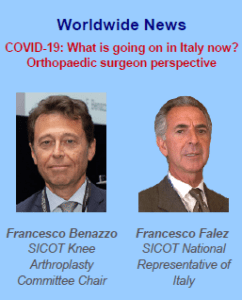
The coronavirus outbreak is disrupting the routine and lives of orthopaedic surgeons in Italy, at a scaled progression across the country, and now throughout Europe, although on other parts of the continent at different speeds and levels of penetration.
In Italy, the surgeons devoted to musculoskeletal surgery achieve the title of specialist in orthopaedics and traumatology: in other words, there is no separation between the two branches of our specialty. However, only a smaller number of surgeons practice both, giving preference during their career to a more specific branch, such as hip or knee surgery, while others keep doing the dirty but noble job of fixing fractures.
The first consequence of the virus outbreak has been to stop elective surgery (stopped from one day to another in the most affected areas, and progressively all over the nation), and to challenge the traumatologists: fractures cannot wait! In Lombardy, the most affected region of this epidemic, 3 hubs have been selected, and all other hospitals have become spokes for traumas.
In other words, polytraumas should be referred to hubs, where only a few places in the ICU are kept available for them, minor traumas
(e.g., femur fractures of the elderly) can be treated in the other hospitals.
The issues are: many elderly people with fractures are positive to COVID-19 and many of them will not survive surgery; who should be treated and who should not, this is an ethical issue to be considered; surgeons from spoke hospitals must guarantee their presence in case they are needed in the hubs, to take the place of doctors if overwhelmed by the traumas or targeted by the virus; in many hospitals, orthopedists are requested to serve in medical wards, to help the generalists; finally, the trauma cases have declined in numbers and severity due to the obligation of the population to stay at home, but the numbers are still relatively high and many surgical theaters have been converted to IC rooms. This is the true disruption of our routines, as premised above.
For many orthopaedic surgeons all over Italy, who are by definition pro-active and decision-makers, the situation is causing frustration and there are fears for the future.
As a matter of fact, the healthcare system in Italy, despite the recognized high quality provided for the entire population, is suffering for various reasons. It has been affected by political decisions in the past 15 years, with a progressive reduction in attention and funding, under the false hope to save money. Doctors have been obliged to lose bargaining power, and they have been subjected to a short sighted political governance leading to a huge discrepancy in quality of assistance between Northern and Southern Italy and to the structural deficiencies revealed by this emergency. Therefore, we are facing a difference in quality and quantity in terms of assistance in the different regions.
This has been made up only by the heroism and dedication of the doctors and paramedical staff.
A huge effort to increase the number of IC beds, and sub intensive wards, as well as of the medical personnel (ten thousands of freshly graduated doctors will be “thrown” into the field, with no specialized experience at all!) is ongoing, with a reallocation of large capitals. What about when all this will be over? Will the public health system be able to withstand again the routine including elective orthopedic surgery? Is the scenario of an imposed reduction of the prosthetic surgery feasible?
If we want to look positively in any case, we must admit that the medical community is achieving an unexpected level of admiration and respect for the commitment showed in treating the infected patients, and is gaining much more consideration from politicians and administrators than before the epidemic. Hopefully, this will bring, after the end of the COVID-19 crisis (because we must believe that the epidemic will end at a certain moment), a renewed consideration of the unmet needs: more resources for universities and teaching, better distribution of the resources in the country, clear understanding from the payers, either public or private, that the quality of materials used in orthopaedics is more important than merely a money-saving attitude.
These are at the moment the thoughts and perspectives of two average Italian orthopaedic surgeons.
